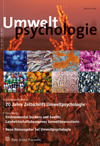Artikeldetails
 Marcel Hunecke (2017),
Marcel Hunecke (2017),Umweltpsychologie in der transdisziplinären Nachhaltigkeitsforschung .
Umweltpsychologie 21(1), 13-24.
Dieser Artikel wurde in deutsch verfasst.
| Zusammenfassung: | Vor 20 Jahren startete die Entwicklung eines Forschungsprogramms, das sich mittlerweile unter der Bezeichnung sozial-ökologischen Forschung als Bezugsrahmen für die transdisziplinäre Nachhaltigkeitsforschung in Deutschland etabliert hat. Hierzu liefert die Umweltpsychologie inhaltliche Beiträge zu fünf Themenfeldern: Handlungs- und Entscheidungsmodelle, Umweltwahrnehmung und Risikoakzeptanz, Handeln im Umgang mit komplexen Problemen, ökologisch-soziale Dilemmata und Strategien zur Förderung eines nachhaltigen Alltagsverhaltens. In den letzten 15 Jahren hat vor allem umweltpsychologisches Wissen aus den beiden Themenfeldern Handlungs- und Entscheidungsmodelle sowie Strategien zur Förderung eines nachhaltigen Alltagsverhaltens Eingang in die transdisziplinäre Nachhaltigkeitsforschung gefunden. Für die Zukunft stellen sich neue Herausforderungen an die Umweltpsychologie, wie beispielsweise die partizipative Einbindung von BürgerInnen in Planungsprozesse, die sowohl auf eine Steigerung des Umwelt- und Klimaschutzes, als auch der Lebensqualitäten ausgerichtet sind. Abschließend wird im Beitrag das Selbstverständnis der Umweltpsychologie innerhalb der transdisziplinären Nachhaltigkeitsforschung reflektiert. Hierbei zeigt sich zum einen, dass sich umweltpsychologische Erkenntnisse und Methoden in der transdisziplinären Nachhaltigkeitswissenschaft etabliert haben. Zum anderen resultiert hieraus jedoch auch die Frage, ob die Umweltpsychologie ihre psychologische Disziplinarität in Zukunft aufrecht erhalten kann oder sich stattdessen in eine inter- und transdisziplinär ausgerichtete Nachhaltigkeitswissenschaft integrieren wird. |
| Schlagworte: | Interdisziplinäre Forschung Nachhaltige Entwicklung Umweltpsychologie Umweltschutzverhalten |
| Abstract: | Twenty years ago marked the starting point for the development of a research program which has by now come to be established under the general term ‘social-ecological research’. Today, it serves as a reference frame for transdisciplinary sustainability research in Germany. The field of environmental psychology provides contentual contributions to five major areas of this research program. These are: behavioral models and decision-making models, environmental perception and risk acceptance, behavior when dealing with complex problems, ecological-social dilemmas, and strategies to promote sustainable behavior in everyday life. Over the last 15 years, mainly the insights from the areas of behavioral models and decision-making models, as well as strategies to promote sustainable behavior in everyday life have been incorporated into transdisciplinary sustainability research. The future will present new challenges to the field of environmental psychology, such as the promotion of participatory involvement of citizens in planning processes that are oriented both towards increasing environmental conservation and climate protection, as well as towards improving quality of life. The final part of this article reflects on the concept that environmental psychology has formed of itself within the context of transdisciplinary sustainability research. Here, it appears that on the one hand insights and methods from environmental psychology have become well-established in transdisciplinary sustainability research. On the other hand, this raises the question of whether environmental psychology will be able to keep its disciplinarity as a subfield of psychology, or whether it will instead fully integrate itself into an inter- and transdisciplinary-oriented sustainability science. |
| Keywords: | Ecological Behavior Environmental Psychology Interdisciplinary Research Sustainability Development |
Zum Inhaltsverzeichnis

